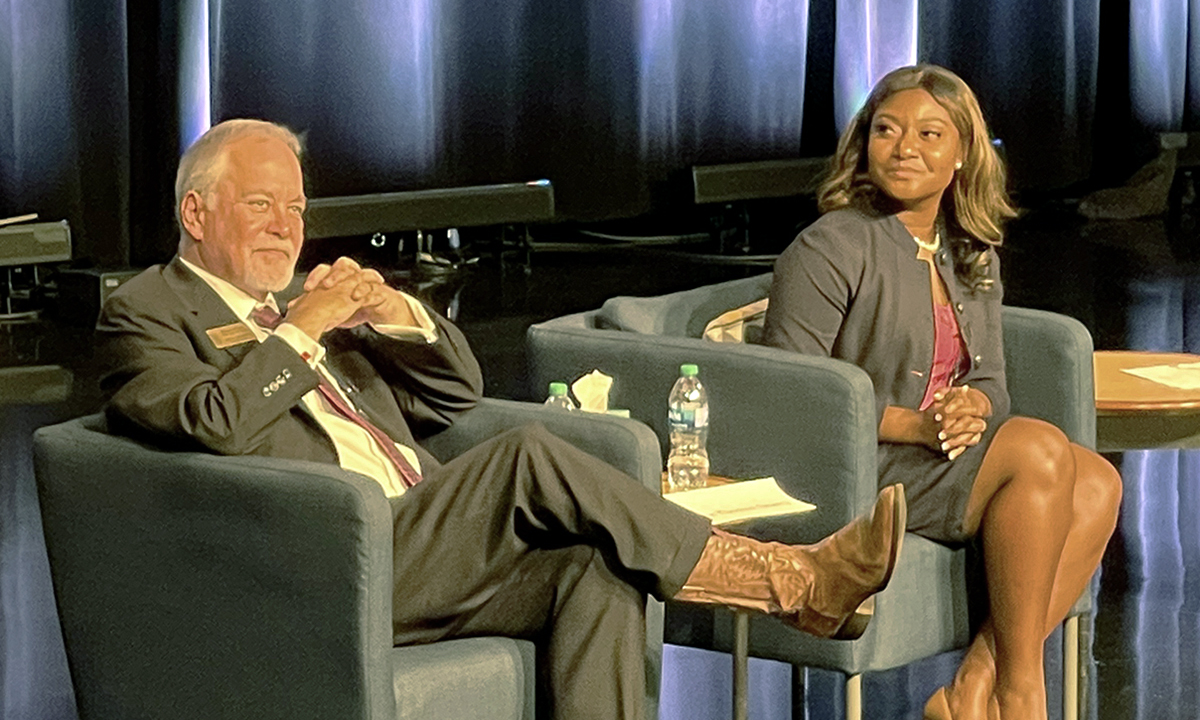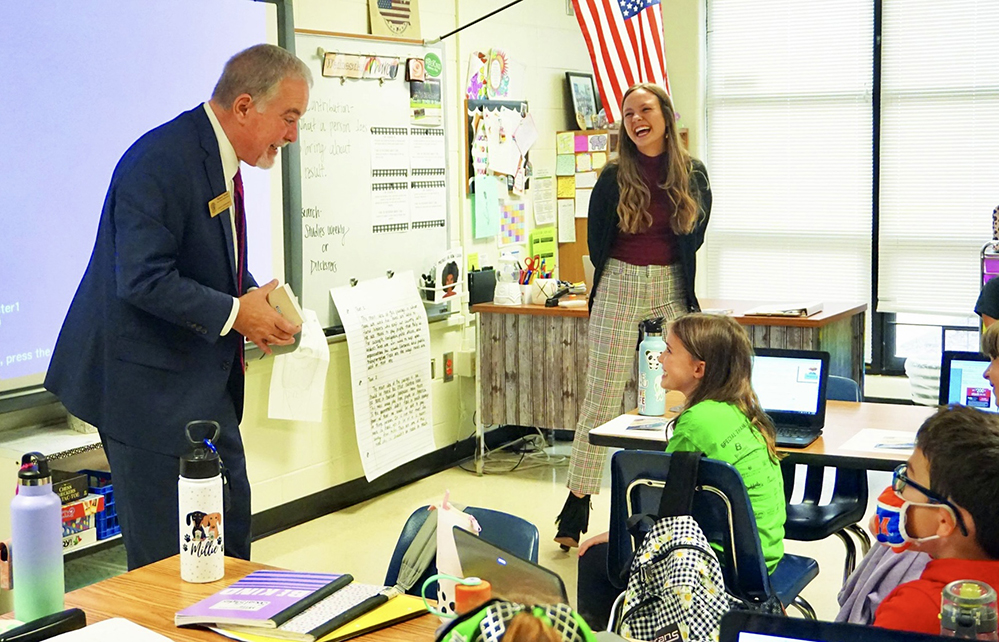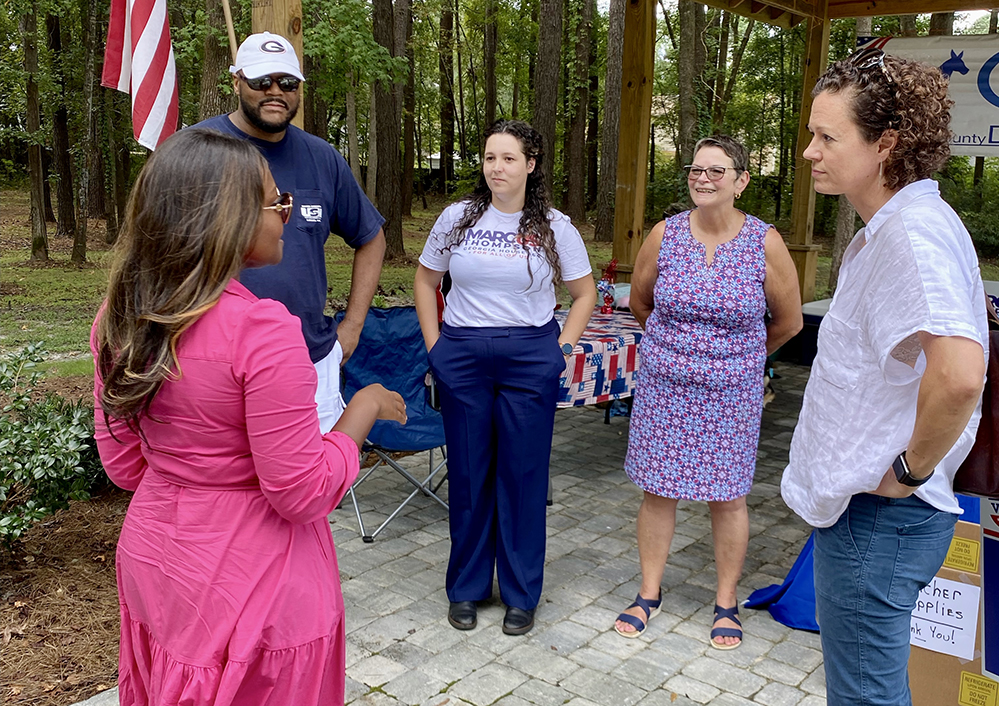School Choice Blurring Party Lines in Georgia Superintendent Race as Teachers’ Union Aims to Take Down Democrat
Race for school superintendent pits GOP incumbent Richard Woods against former state representative and school choice advocate Alisha Thomas Searcy

Get stories like this delivered straight to your inbox. Sign up for The 74 Newsletter
Among the six candidates the Georgia Association of Educators endorsed for statewide office, all were Democrats, save one: Republican schools Superintendent Richard Woods.
The two-term incumbent’s support of a controversial new “divisive concepts” law that restricts what teachers can say about race and diversity in the classroom was apparently less worrisome to the union than the platform of Alisha Thomas Searcy, his Democratic challenger.
“His opponent, regrettably, has a long history of advocating for taxpayer funding of private schools that we cannot overlook,” President Lisa Morgan said when announcing the union’s slate of candidates.
Searcy was elected to the state House at just 23 and consistently advocated for school choice legislation during her 12 years in office. She co-authored a law that allows students to transfer to other schools within their district, voted in favor of the state’s tax credit scholarship program and championed a constitutional amendment creating the State Charter Schools Commission. Groups seeking to start a new charter school can apply directly to the commission instead of their local district.
“It’s opening up opportunities within public education for literally hundreds of thousands of children,” Searcy said, noting that her views are likely to earn her some Republican votes. “I have a track record of working across the aisle and having bipartisan relationships.”
Woods also supports charter schools, but expanding choice has not been the focus of his campaign.
The match-up between Woods and Searcy is occuring in the shadows of two high-profile Georgia contests — the rematch between Republican Gov. Brian Kemp and voting rights advocate Stacey Abrams, and the U.S. Senate race between Democratic incumbent Rev. Raphael Warnock and former football star Republican Herschel Walker. But with growing concerns over using federal relief funds to boost student achievement and supporting a beleaguered teacher workforce, the state’s schools face a critical moment.
The candidates “don’t have traditional platforms that align with what you would expect,” said Mikayla Arciaga, a former Atlanta Public Schools teacher and education advocate. “This is a true test of voter education and whether people really weigh what is most important.”
Searcy won the primary with 57% of the vote, avoiding a runoff. She complained on Facebook recently that Abrams and Democratic groups have shunned her, likely because of her focus on school choice. But she told The 74 that she thinks those groups have since “changed course.”
“There may have been a problem with the establishment, not with voters,” she said. “I’m optimistic about being included on everything and moving forward.”
‘Can’t ride the middle’
Both Woods and Searcy have pledged to increase support for teachers. A former teacher and administrator, Woods has reduced the number of annual teacher evaluations and cut back on standardized testing. Now he’d like the federal government to only require testing every other year and for districts to pare down local assessments.
Woods also called for a report on teacher burnout — a collection of recommendations for protecting teachers’ planning and teaching time, removing “unrealistic expectations” and increasing mental health support. Hailing from a county in central Georgia, Woods could appeal to rural voters who often feel disconnected from laws and policies dictated from Atlanta.
“He has done things that have helped, but you can’t unequivocally say he’s a champion for teachers,” Arciaga said. “He can’t ride the middle anymore.”

During a recent candidate forum hosted by the Georgia Partnership for Excellence in Education and Learn4Life, Searcy took a shot at Woods’s record on teachers, contrasting it with her own experience as a former superintendent of a small all-girls charter school network.
“I didn’t just listen and produce a report. I took action because that’s what strong superintendents do,” she said. She said she ensured teachers had enough classroom supplies, gave them $500 for training opportunities and held celebrations when teachers signed contracts to return the next year. During her tenure at Ivy Preparatory Academy, from 2015 to 2018, she said she increased teacher retention from 25% to 75%.
Searcy, who lost in a Democratic primary for state superintendent in 2014, argued that the incumbent hasn’t done enough to push for higher teacher pay. According to the National Education Association, the starting salary for teachers in the state, $38,692, ranks 35th, and the average pay of $60,553 ranks 21st.
Professional respect
The election also comes as the state implements a new “divisive concepts” law that many argue is vaguely worded and undermines teachers’ professionalism. Some districts have balked at adopting local policies that would allow parents or others to file complaints about a teacher’s comments. The school board in the DeKalb County district initially resisted for two months, but then reversed course, passing its policy last week.
Searcy said she supports those districts’ positions on the issue and if she’s elected, would make sure the guidance for teachers is clear and protects them from consequences as long as they’re teaching state standards.
“Teachers are concerned the state doesn’t respect them as professionals to know what to teach and how to teach it,” she said.
A former history teacher, Woods told The 74 there was nothing in the law “that would prevent me from being a great teacher.” But he said districts that don’t pass a complaint policy could risk their accreditation or status as “charter” districts immune from some state regulations.

For voters, the decision may come down to their experience. Woods said his 25 years in K-12 schools give him an advantage over Searcy, who has not been a teacher.
But some of her supporters say it’s time for a fresh perspective.
“We need a leader who has experience in 21st century schools,” said Jason B. Allen, an educator who served on Ivy Prep’s board and ran unsuccessfully last year for the Atlanta school board.
Ultimately, voters may make their decisions based on who they support for governor, said Charles Bullock, a political science professor at the University of Georgia. In that case, Democrats opposed to expanding school choice could be surprised if they choose Searcy, he said.
He added that some of the dissatisfaction parents have expressed at local school board meetings over the past year hasn’t reached the state level enough to attract more interest in the superintendent’s race.
“Even if one of these candidates wins the lottery,” he said, “there’s so much noise over the Senate and gubernatorial contests, it’s hard to get people’s attention.”
Get stories like these delivered straight to your inbox. Sign up for The 74 Newsletter

;)
